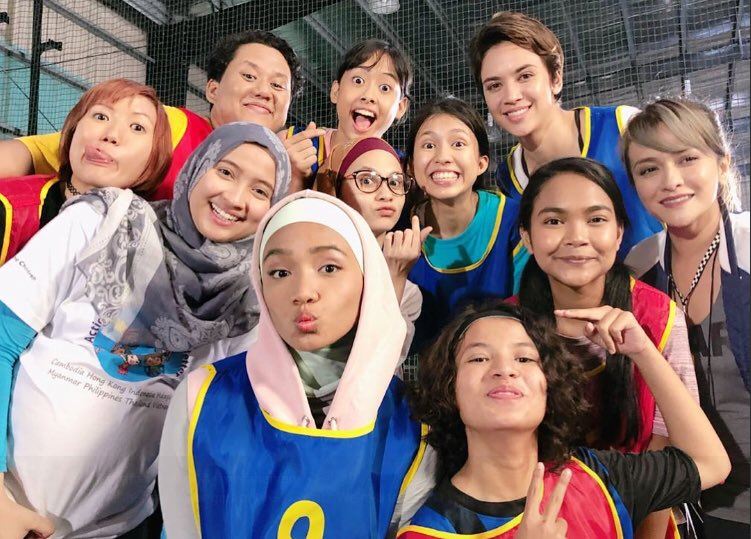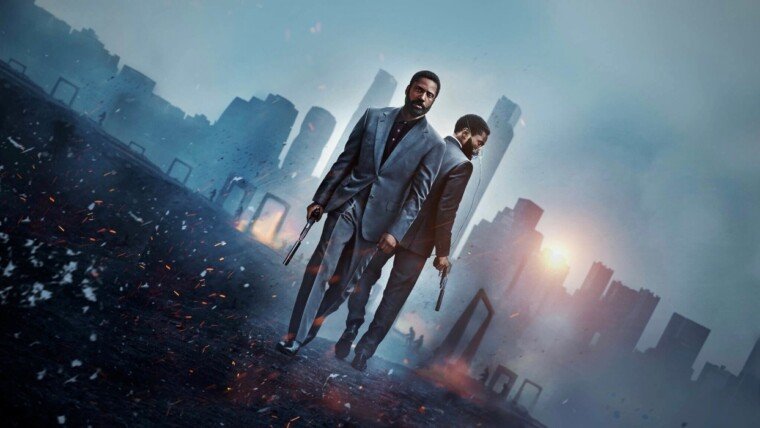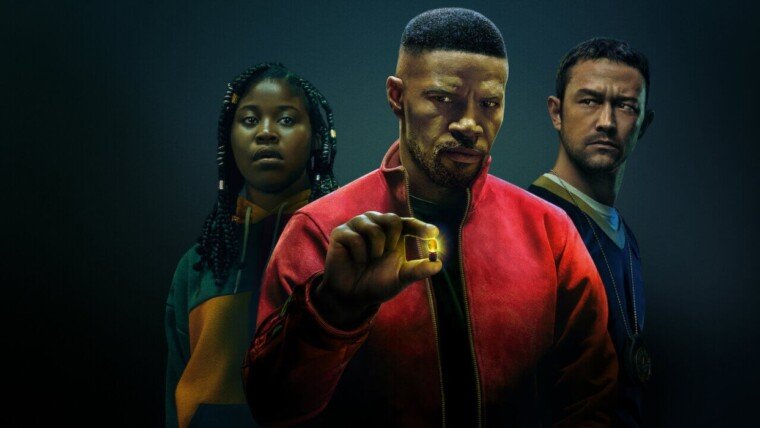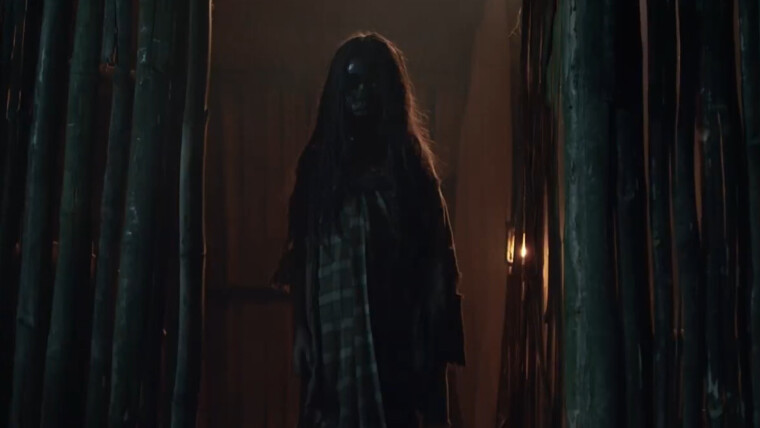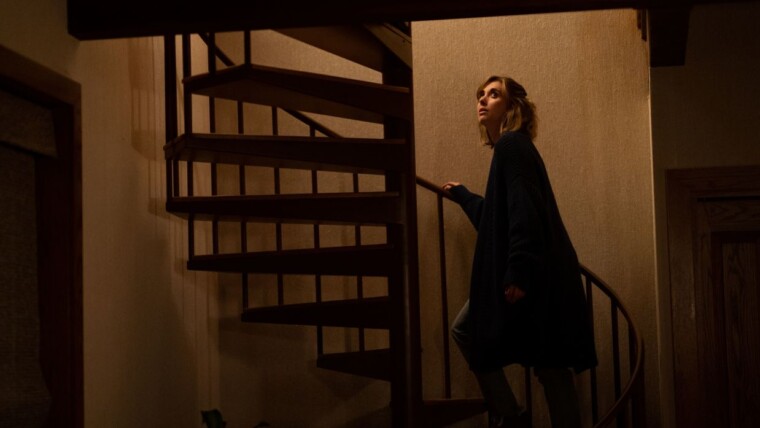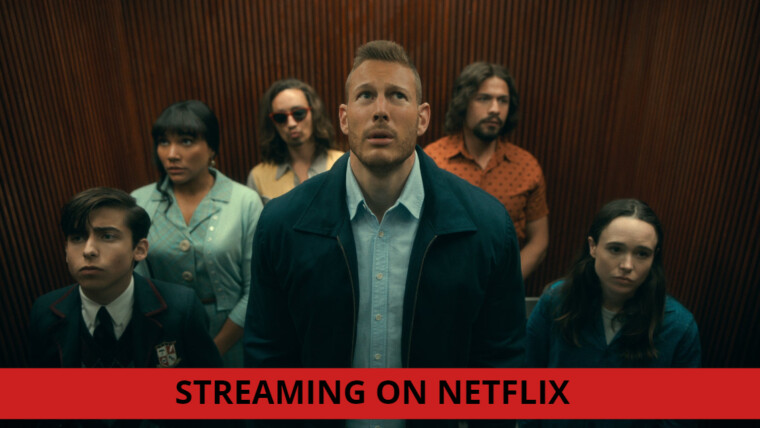Full disclosure: One of the supporting actors in the film is a sibling of a friend of mine.
Gol & Gincu 2 is a film that has its warm heart in the right place. Its intentions are good, which is more than I can say about a lot of mainstream films, especially local ones. Consider our two polar opposite central characters. When we first meet Zak, an affluent, English speaking, non-tudung wearing, sexily (not necessarily in the way she dresses, but her personality) tomboyish girl, she comes off as very bitchy — let’s just say she would fit right in with The Plastics. I winced, worried that this would turn out to be the type of movie that vilified “people like her” and made heroes out of… Yaya, a more conservative, tudung-wearing, lower-middle-class girl, who’s also a scholar, family girl and a social media influencer.
You see, Yaya is what my neighbour aunty would call a “good Muslim woman,” the kind that kisses an elderly person’s hand when she greets them; Zak prefers a regular handshake, much to the annoyance of Yaya’s sister. Yaya excitedly wakes up at 3 am for early morning prayers (Yaya? More like ya right); Zak needs to be woken up by the hostel leader…. You see where I’m going with this? Conventional knowledge of local films would lead you to believe that by the end of Gol & Gincu 2, Zak would ditch her ripped jeans and multiple piercings for a pair of Baju Kurung and pastel coloured headscarves. And I would’ve rolled my eyes so far back, it would give the Tony Stark meme a run for its money.
But I didn’t have to worry. Director Umi Salwana Omar and writers Rafidah Abdullah and Nadia Khan raise their middle fingers to conventional wisdom and flips the script on its head. As the film plays out, Yaya who initially seemed like the perfect woman, turns out to also be judgemental and slightly prejudiced, while underneath Zak’s “fu*k the world” attitude is someone who’s open-minded and accepting. And the film as a whole isn’t focused on which type is better, but rather shows us that nobody is perfect — there is no “right type.” This is a film that looks at various personalities, colours and sizes through a non-judgemental prism. One of the supporting characters is a pregnant teen who doesn’t want her pictures uploaded on Social Media not because she’s ashamed of her pregnancy, but because she’s afraid that the asshole who impregnated her would come stalking.
It’s also a film that is unabashedly female-centric. There’s no romantic subplot nor is there backstabbing and betrayals in the name of cute boys (the film even makes a joke about it. When Yaya and Zak argue in the Surau, the campus journalists looking in from the outside assume they’re arguing about boys, when in actual fact, the girls are arguing because of their own issues). This is a com, without the rom and I appreciate it for that.
I also appreciate the tiny details, like the scene where Yaya packs her period pads in her bag, nonchalantly, like it’s something totally normal — can you imagine that? It’s these sorta things that make me smile, things that would make the elderly women in Akshay Kumar’s Padman squirm. There’s just one small problem. Gol & Gincu 2 feels less like a film and more like a moral value dispensing machine.
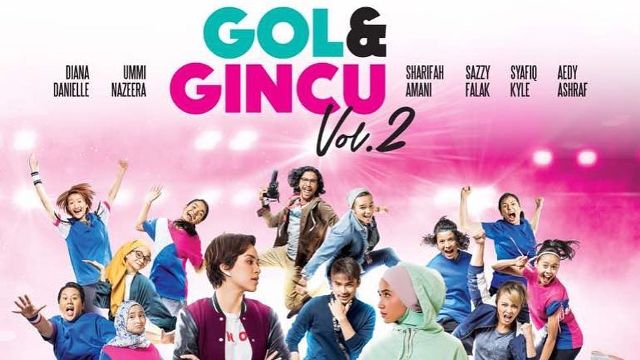
It seems like in their excitement to share liberal values (all values I agree with, by the way) and break stereotypes, the writers forgot to pen a compelling screenplay and tell an engaging story. In fact, I don’t quite know what exactly this movie is about. Sure, you could say it’s about two varsity students and troublemakers who are given an ultimatum by their dean: raise funds for a charitable cause (here it’s Rumah 3R, a safe house for delinquent teens) or pack up and leave the university. But the film has so many other threads that don’t weave together seamlessly.
The girls train for a futsal tournament (there’s an entire arc on this, including training montage sequences) only to lose the futsal tournament (in a string of dramatically barren… montage sequences) and then start preparing for a fashion show (which also has some montage sequences and a song number). At the same time, Gol & Gincu 2 is also about the internet age — the obsession to make a viral video, the need to bend over to please followers, the repercussions of bad PR and the absence of journalistic integrity. Rafidah Abdullah and Nadia Khan also find a way to squeeze in a quickie about the LGBT community (admittedly, this scene actually made me chuckle).
The film is unfocused with no steady escalation of the conflict. Characters are angry a lot of the time. Many scenes start and end with big bursts of emotions that are unearned. Even the insignificant campus journalists have a scene where they’re yelling at each other. Why?

But my biggest issue with the film is this: Almost every single scene in the film ends with a moral value and an exclamation mark! It’s like the writer thumbed through all 36 ‘nilai moral’ in the SPM textbook and found a way to squeeze at least 20 of them in. The problem isn’t that the film has moral values in it, but rather that every single one is overt, explicitly spelt out and then shoved down your throat with an iron rod. Instead of telling a story that we can ponder upon and interpret, Rafidah Abdullah and Nadia Khan seem to have purposefully written independent events (that do not flow) to teach us something.
Early on in the movie Yaya loudly tells Zak, “Do you know that cutting the queue is bad?” Towards the end Yaya makes a video, explaining to her followers (and the audience, just in case the message wasn’t clear), “These may be delinquent kids, one is pregnant, one likes to beat people up, etc, but they’re all nice underneath. It’s their differences that make them special.” I pinched myself to see if I was still at the theatre or was I dreaming that I was back in my high school moral class. There are bland lines about working hard and being optimistic, banal dialogue about being independent vs living off one’s parents’ money and boring conversations that revolve around selfishness and selflessness. The question I kept asking myself throughout the film is where’s the nuance and subtlety? Why can’t characters just hang out and have a chat about the football matches that took place over the weekend, their favourite item from Sephora, their sex lives or just bust each other’s balls? Why does the backstage scene at the fashion show have to include a shoehorned in line about a plus-sized girl’s insecurities?
The film is so much a moral class that we can’t even have two characters share a cigarette and have a conversation for two seconds (they only utter a sentence or two) without another character walking in and angrily lecturing them, “hey hey hey!! She’s pregnant!” Point of the scene: To tell the audience that pregnant women shouldn’t smoke. And yes, of course, the scene ends with the cigarette box tossed on the ground, as the camera zooms in on it — an exclamation mark. Can you hear that? It’s the sound of my eyes rolling back. There’s even a moment where Zak says something along the lines of, “they may not be like us, but apa yang aku belajar dari diorang ialah…” A line that sounds less like two friends talking and more like the opening paragraph of my moral essay.
Because of the abundance of loose threads and the film’s intense desire to dole out values, there’s no breathing room, no space for characters to just be. There are hardly any sequences that feel organic. (Which is why I love the scene in the elevator. A guy who clearly has the hots for Zak stammers nervously and rambles on and on about LGBT, while Zak just stands there, quietly, listening to the dude dig himself a deeper hole, with a sly smirk on her face. We needed more of this.) As a result, we don’t feel the camaraderie and growing friendship between Zak, Yaya and the girls from Rumah 3R. When Zak says, “I thought we’re you’re family too” it feels forced.
Think of a film like Pitch Perfect. There, the narrative is focused: The Bellas want to win the acapella competition. And it is on this singular focused journey do the conflicts arise, do we see friendships blossom and wilt. Gol & Gincu 2, on the other hand, is all over the place. It feels more like a few episodes of the kind of sitcoms you’ll find on Disney Jr, stitched together.

What kept me watching was the performances, not just by our leads but by the entire crop of casts. It’s obvious how much fun these actors are having with one another on set. Their fantastic chemistry is almost infectious. Diana Danielle and Ummi Nazeera are great as Zak and Yaya respectively. The screenplay demands them to throw meaningless tantrums (Zak’s frustration after the first futsal training session makes no sense), but Diana and Ummi sell it. Even when Zak shows signs of bitchiness, through Diana’s performance, you get the sense that there’s more to the character than meets the eye. That perhaps she’s putting up a cold front as a coping mechanism. I also love Ummi’s look of discomfort when she first sees the pregnant girl.
The supporting characters are so much fun as well. Consider the character Shanti (Annabel Michael), who’s so alive in her role despite her limited screen time. Even in scenes where she’s slightly unfocused in the background, she’s always reacting to the situations that are unfolding around her. I like that subtle, controlled smile she flashes in the van on the way back from the futsal tournament (you know, the kind of smile that escapes you while your mom is scolding you about something seemingly serious, but also kinda funny. The kind of smile that doesn’t escape you when your dad is the one doing the scolding). There’s a spunkiness about Shanti that I enjoy. The same spunkiness can be seen in characters like ‘gangster’ and the tiny girl with the frizzy hair who always has something cheeky to say or even the caretaker kak Jie Jie. The actors are good. I just wish they were given a meatier and more nuanced script to work with.
It’s not easy to mark down a film whose heart is in the right place. Gol & Gincu 2 is one such film. I love its boldness; its desire to break stereotypes. This is a film that isn’t interested in pandering to the masses (I wonder what the Malays in the kampungs will have to say about the film’s menstruation jokes). I also love the film’s glossy aesthetic. But here’s the thing, there’s a difference between ideas and execution. And though a great film may have moral values in it, moral values themselves don’t make a great film, nor a good one, nor an entertaining one, nor an emotionally moving one. I always go back to Roger Ebert’s famous quote, when it comes to film, it’s not what it’s about but how it is about it.
Hey you! Yes you, hot stuff. Like my article? Leave a comment below and let me know whatchu think. Also, don’t forget to share it with your buds. And if you’d like to discuss the movie with me you can hit me up on Twitter here: @dashtalksmovies

